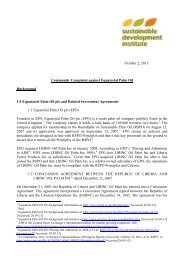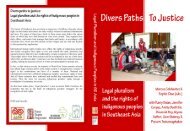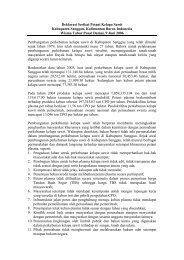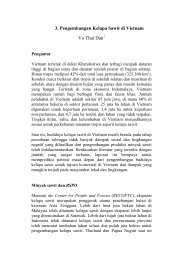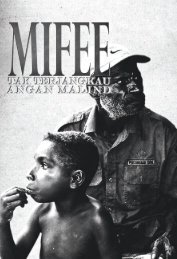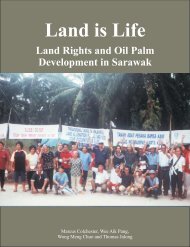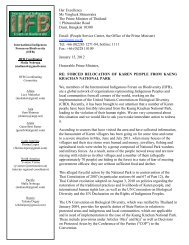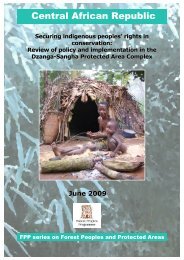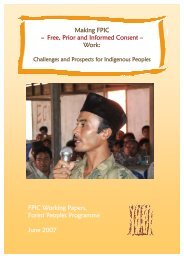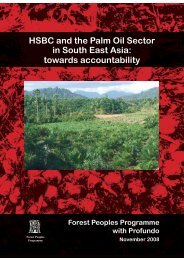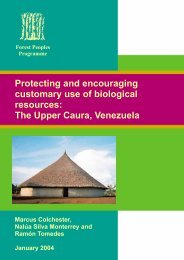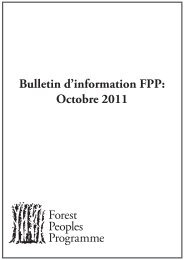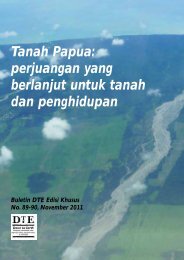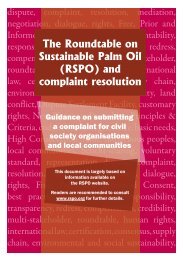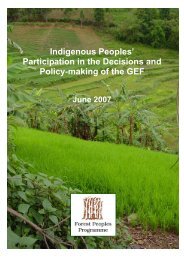Sime Darby oil palm and rubber plantation in Grand Cape Mount ...
Sime Darby oil palm and rubber plantation in Grand Cape Mount ...
Sime Darby oil palm and rubber plantation in Grand Cape Mount ...
Create successful ePaper yourself
Turn your PDF publications into a flip-book with our unique Google optimized e-Paper software.
<strong>Sime</strong> <strong>Darby</strong> <strong>oil</strong> <strong>palm</strong> <strong>and</strong> <strong>rubber</strong> <strong>plantation</strong> <strong>in</strong> Gr<strong>and</strong> <strong>Cape</strong> <strong>Mount</strong> county, Liberia<br />
<strong>in</strong> such a way that the chief is similar to a k<strong>in</strong>g but presides over a Council made of elders,<br />
zoes, women, youths, <strong>and</strong> skilled <strong>in</strong>dividuals such as hunters, healers <strong>and</strong> lead farmers.<br />
The non-customary, formal local authorities operate at the district level, county level, <strong>and</strong><br />
then at central government level. There are also local senators <strong>and</strong> legislators who represent<br />
the adm<strong>in</strong>istrative sub-units, or counties. Each of the fifteen counties <strong>in</strong> Liberia elects two<br />
Senators who represent that county. There are two senators <strong>and</strong> four representatives <strong>in</strong> the<br />
Gr<strong>and</strong> <strong>Cape</strong> <strong>Mount</strong> county. In terms of l<strong>and</strong>, the highest authority <strong>in</strong> the district is the District<br />
L<strong>and</strong> Commissioner, above whom lies the County L<strong>and</strong> Commissioner <strong>and</strong> the County<br />
Super<strong>in</strong>tendent. In central government, the executive bodies <strong>and</strong> other government agencies<br />
responsible for matters relat<strong>in</strong>g to l<strong>and</strong> <strong>in</strong>clude the M<strong>in</strong>istry of L<strong>and</strong>s, M<strong>in</strong>es <strong>and</strong> Energy<br />
(MLME), the M<strong>in</strong>istry of Agriculture, the M<strong>in</strong>istry of Internal Affairs, the L<strong>and</strong>s<br />
Commission, the Forestry Development Authority (FDA) <strong>and</strong> the President’s Office.<br />
For the most part, the local <strong>and</strong> national authorities are only <strong>in</strong>volved <strong>in</strong> undeeded customary<br />
l<strong>and</strong> areas <strong>in</strong> the study area when communities or <strong>in</strong>dividuals apply to formalise their l<strong>and</strong><br />
ownership (by apply<strong>in</strong>g for a Public L<strong>and</strong> Sale Deed, hav<strong>in</strong>g first sought a Tribal L<strong>and</strong><br />
Certificate), or where the government decides to grant forest, m<strong>in</strong><strong>in</strong>g or agricultural<br />
concessions to a third party. Community l<strong>and</strong> is perceived by customary communities as<br />
belong<strong>in</strong>g to them <strong>and</strong> subject to customary rules whether it is formally deeded or not. By<br />
contrast the clear countervail<strong>in</strong>g perception from most government bodies is that all undeeded<br />
l<strong>and</strong> is public l<strong>and</strong> belong<strong>in</strong>g to the government.<br />
4. The national legal framework on the acquisition of customary l<strong>and</strong>s <strong>and</strong> resources<br />
As exemplified <strong>in</strong> this case study, the dom<strong>in</strong>ant government perception of customary l<strong>and</strong>s is<br />
that where they have not been formalised <strong>in</strong> some way, they are considered ‘public l<strong>and</strong>’,<br />
with communities hold<strong>in</strong>g only usufruct/possessory rights, but not proprietary rights. 7 The<br />
government therefore concludes that this l<strong>and</strong> is available for state allocation of longleaseholds<br />
to third parties e.g. for large-scale agricultural concessions such as <strong>Sime</strong> <strong>Darby</strong>’s. 8<br />
The Public L<strong>and</strong>s Law does not def<strong>in</strong>e ‘public l<strong>and</strong>s’, but implicitly considers public l<strong>and</strong>s as<br />
be<strong>in</strong>g owned by the government, s<strong>in</strong>ce the law is concerned with the mechanisms by which<br />
public l<strong>and</strong> is acquired from the government. 9 However, the L<strong>and</strong> Registration Law states<br />
that except where otherwise provided, ‘all unclaimed l<strong>and</strong> shall be deemed to be public l<strong>and</strong><br />
until the contrary is proven’. 10 Under the L<strong>and</strong> Registration Law, l<strong>and</strong> free from private rights<br />
are to be recorded as public l<strong>and</strong>, <strong>and</strong> if the l<strong>and</strong> is subject to ‘tribal reserves’ or ‘communal<br />
hold<strong>in</strong>gs’, these shall be recorded. 11 This suggests that customary rights as expressed as<br />
‘tribal reserves’ or ‘communal hold<strong>in</strong>gs’ will be considered possessory or usufruct titles on<br />
state-owned l<strong>and</strong>.<br />
Given the unresolved legal position of customary communities’ under the H<strong>in</strong>terl<strong>and</strong>s<br />
Law/Aborig<strong>in</strong>es Law, customary l<strong>and</strong> rights are highly vulnerable to be<strong>in</strong>g overridden as<br />
‘public l<strong>and</strong>’ <strong>and</strong> allocated to third parties by government. Communities can formalise their<br />
rights us<strong>in</strong>g the Public L<strong>and</strong>s Law’s procedure for obta<strong>in</strong><strong>in</strong>g a ‘Public L<strong>and</strong> Sale Deed’.<br />
However, this procedure is lengthy, costly, <strong>and</strong> bureaucratic, <strong>and</strong> therefore prohibitive for<br />
many rural communities. 12 It also requires the applicant community to ‘pay a sum of money<br />
as token of his good <strong>in</strong>tention to live peacefully with the tribesmen’, <strong>and</strong> for the District L<strong>and</strong><br />
Commissioner to be satisfied that the l<strong>and</strong> does not form part of the Tribal Reserve <strong>and</strong> is not<br />
otherwise owned or occupied. Clearly this procedure is ill-suited to a tribal community<br />
4



